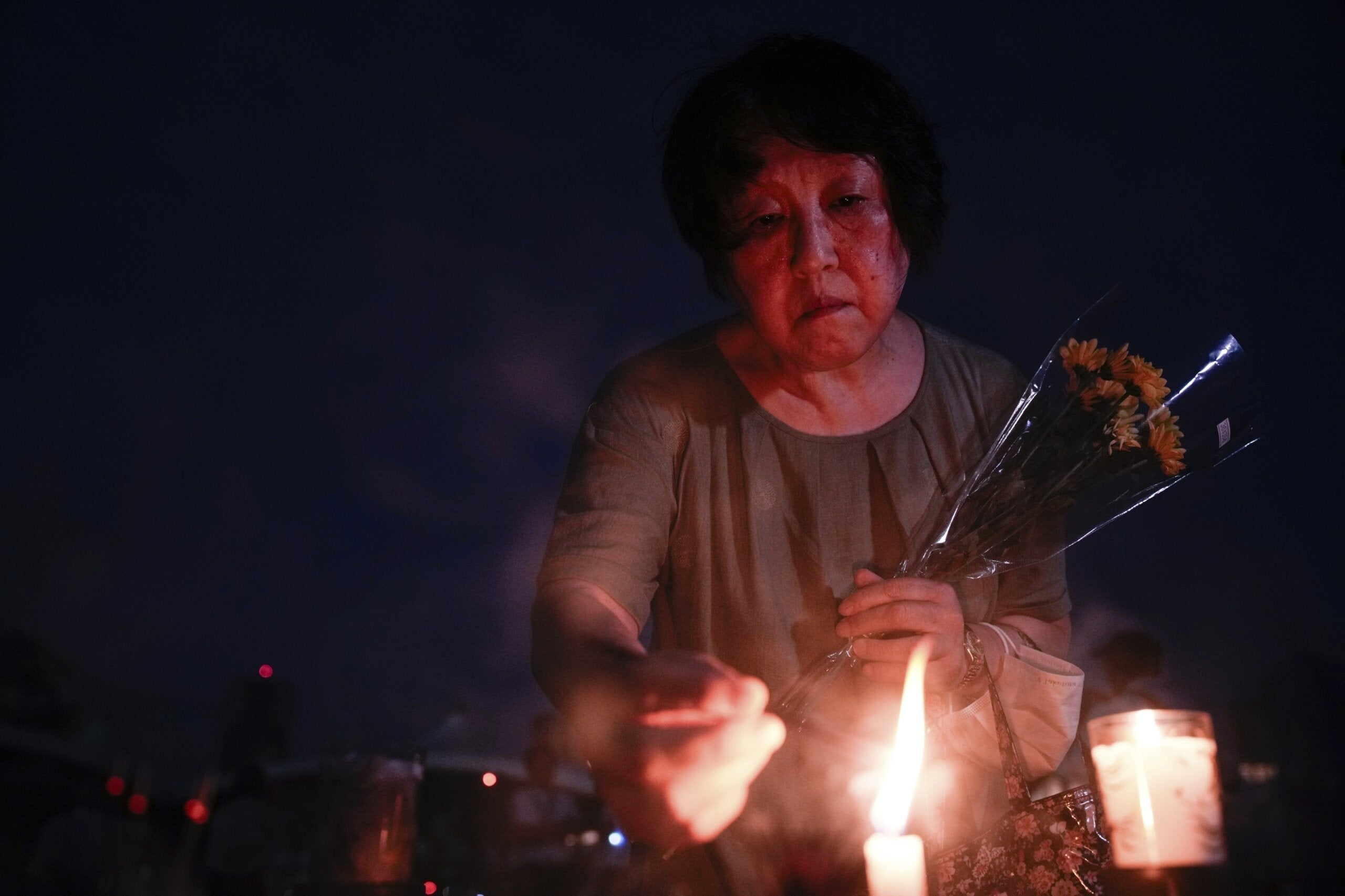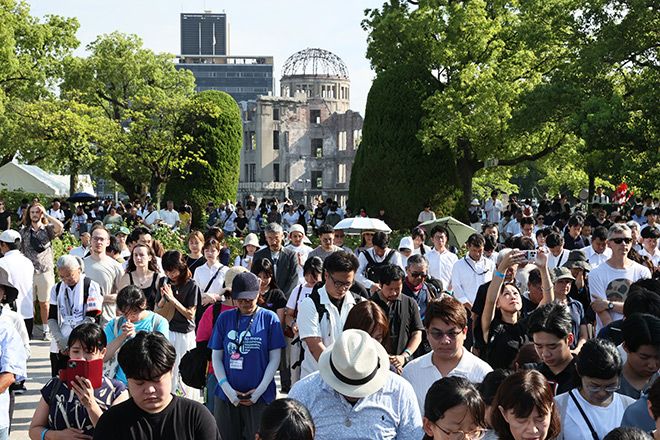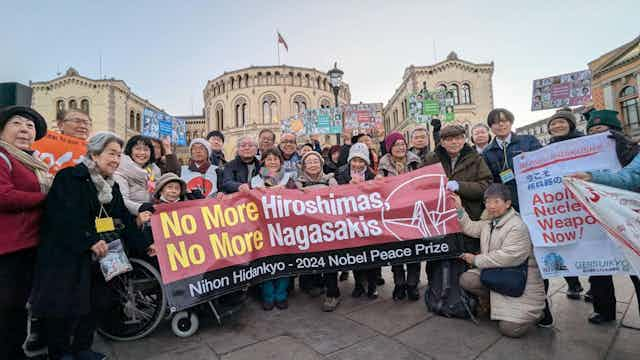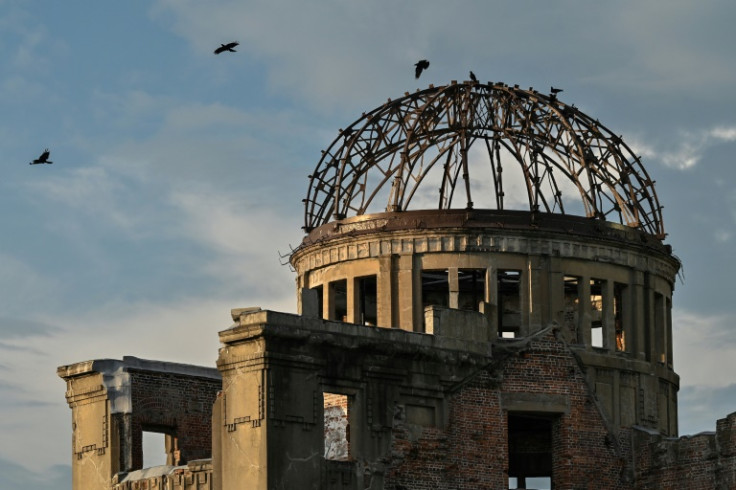
80 Years After Hiroshima – A Warning to Today’s Generation
Introduction: Silence at 8:15 AM
On August 6, 2025, exactly 80 years after the atomic bombing of Hiroshima, a minute of silence fell over Peace Memorial Park at 8:15 a.m. — the exact moment the bomb detonated in 1945. Around 55,000 people gathered, including representatives from 120 countries (Politico).
That silence was more than remembrance; it was a warning. Survivors — the hibakusha — are now few. Their voices, once a chorus against nuclear war, are fading. Their message is urgent: what happened here must never happen again.
1. Hibakusha: A Legacy Fading Away
Who They Are
The hibakusha are survivors of the atomic bombings of Hiroshima and Nagasaki. Once numbering in the hundreds of thousands, fewer than 100,000 remain alive today. Their average age now exceeds 86 years (The Guardian).
Passing the Torch
Organizations like Nihon Hidankyo — the Japan Confederation of A- and H-Bomb Sufferers Organizations — are training “memory keepers” and young advocates to preserve these testimonies (Wikipedia).
As Minoru Suzuto, 94, said:
“There will be nobody left to pass on this… in 10 or 20 years… that’s why I want to share my story as much as I can” (AP News).
Survivor Satoshi Tanaka put it bluntly:
“We haven’t learned anything in 80 years” (El País).
2. The 80th Anniversary Ceremony: Global Witness
A World Gathering
This year’s commemoration drew a record 120 nations to Hiroshima (Politico). Yet, despite the diplomatic turnout, survivors expressed deep concern that nuclear deterrence remains a cornerstone of global security policy.

Calls from Leaders
-
Mayor Kazumi Matsui urged leaders to abandon reliance on nuclear arms, warning that they threaten to “topple the peacebuilding frameworks” established after WWII (The Guardian).
-
UN Secretary-General António Guterres, in a statement, called for recommitment to disarmament and preserving the memory of Hiroshima.
Survivor Advocacy
Nihon Hidankyo, winner of the 2024 Nobel Peace Prize, demanded that nations condemn nuclear weapons and honor survivor experiences (Wikipedia).
3. Why Hiroshima Matters in 2025
Escalating Nuclear Risks
The anniversary comes amid worsening geopolitical crises:
-
Russia–Ukraine war
-
Ongoing conflicts in the Middle East
-
Modernization of nuclear arsenals by major powers
Survivors fear these events normalize nuclear weapons as tools of statecraft rather than last-resort horrors (AP News).

The Danger of Forgetting
Once the last survivors are gone, moral accountability could fade. As Tanaka warns:
“So many died without being able to tell their story… That’s why we’re speaking out, so that it won’t be forgotten” (El País).
4. From Hiroshima to Your Life
Hiroshima’s lesson is not only about nuclear war — it’s about the fragility of civilization. Survivors recall charred faces, scorched bodies, families torn apart. These stories are a warning for every person alive today (AP News).
Deterrence ≠ Disarmament
Japan itself has not signed the UN Treaty on the Prohibition of Nuclear Weapons, relying instead on the U.S. nuclear umbrella — a contradiction survivors call out as hypocrisy (Politico).
5. Five Themes to Remember
-
Memory Fades, Impact Remains — Institutionalize survivor testimony.
-
Strategy vs. Morality — Treating nukes as “strategic tools” erodes the moral line.
-
Youth Leadership — Young voices must carry the torch.
-
Today’s Crises — Ukraine, Middle East, and Asia remind us escalation is real.
-
Preparedness ≠ Panic — Be informed, act rationally, and prepare responsibly.
6. What You Can Do
-
Support survivor voices — Donate to groups like Nihon Hidankyo.
-
Share testimonies — Spread documentaries and memoirs from hibakusha like Setsuko Thurlow.
-
Educate your community — Host events, talks, or school programs.
-
Prepare for emergencies — Build a personal plan and stock essential supplies.
🔮 What Happens Next?
History tells us that peace is fragile. The next decade could unfold in several ways:
✅ Best Case – A Calmer World
-
Global agreements ease nuclear tensions.
-
Supply chains stabilize.
-
Time to strengthen household preparedness.
⚖ Mid Case – Ongoing Instability
-
Regional conflicts simmer without full escalation.
-
Temporary shortages of food, fuel, or medicine.
-
Rising living costs and increased uncertainty.
⚠ Worst Case – Global Crisis
-
A major nuclear incident in a conflict zone.
-
Widespread blackouts, communication loss, and infrastructure collapse.
-
Severe shortages of essentials for weeks or months.
🛠 What You Can Do to Prepare (Now)
If a crisis hits, preparation done before it starts could be the difference between safety and danger. Start today:
-
72-Hour Survival Kit
-
Water, non-perishable food, flashlight, radio, spare batteries, first-aid kit.
-
-
Long-Term Water Security
-
Portable water filters and emergency purification tablets.
-
-
Backup Power
-
Solar chargers, compact generators.
-
-
Family Evacuation & Communication Plan
-
Pre-designated meeting points and non-internet communication methods.
-
💡 Preparedness is peace of mind — you hope you never need it, but you’ll be glad you have it.
Conclusion: A Warning and a Choice
Eighty years after Hiroshima, the commemoration is no longer just about the past — it’s a call to action for the present. The hibakusha’s message is clear: the danger is still here.
Our choice is equally clear: ignore the lessons and risk repeating history, or prepare — mentally, politically, and practically — for whatever the future may bring.
And while world leaders debate policy, you can take steps today to protect yourself and your loved ones. Because peace is not guaranteed — but your readiness can be.

Share


